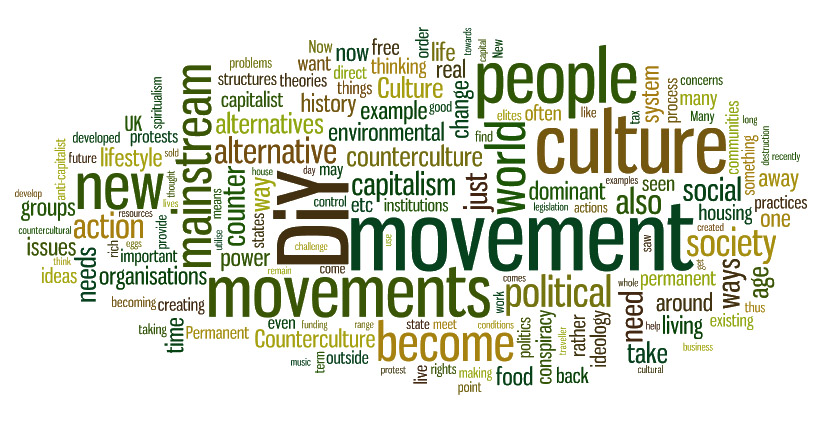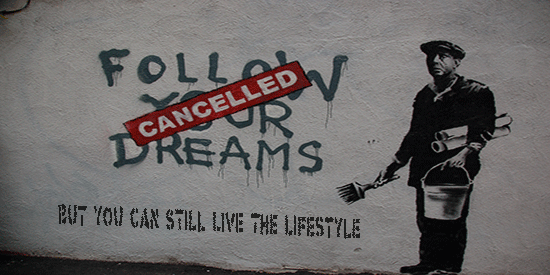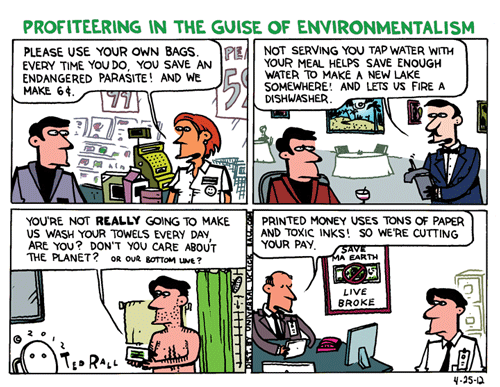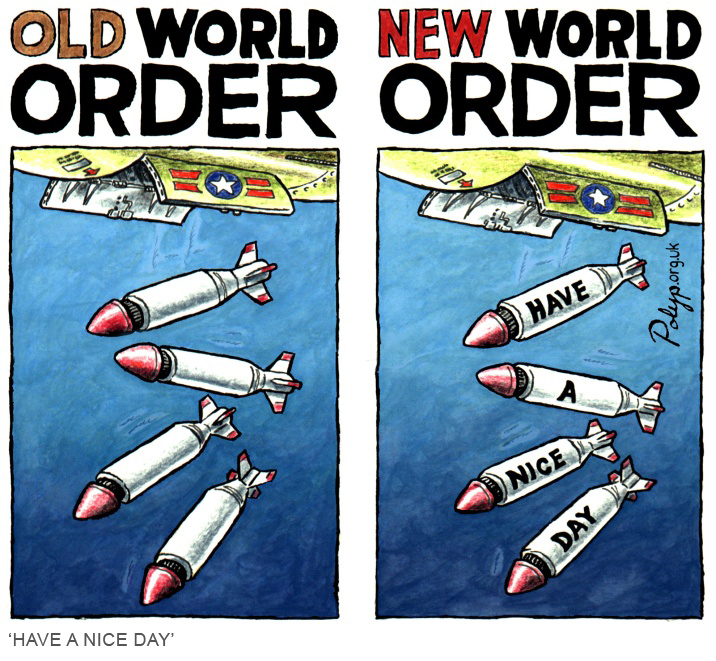“The Do It Yourself (DiY) ethic seeks to overthrow the idea that we will be provided for. We will provide for ourselves, through educating each other, through collective decision making. It fits into this larger concept of an ideal society.” (Carlsson, p.46 – Interview with Ben Gillock)
What is DiY/Counterculture:
“Don’t just sit there watching tv, go out and do something less boring instead.” (Why Don’t You, kids TV Series)
DiY and counterculture show us living examples of how a permanent culture could look and operate through offering us a rich and varied history of alternative ways of living and thinking.
Counter culture and DiY culture is similar though they have different roots. There has been many countercultural movements throughout history, yet it is since the 1960’s that many of these ideas really took hold as counterculture develops out of the 1960’s counter culture movements of the United States and DiY culture is a more UK-based movement centred around punk, rave culture, new age travellers movements and anti-roads protests, amongst other things.
Counter Culture
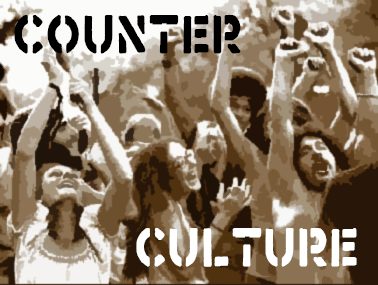 The term counterculture refers to groups that operate outside of mainstream society often showing alternative ways of living, thinking and doing. It can be seen as the cultural equivalent of political opposition because it stands against or outside of mainstream society. It operates in a way that is counter to way that things are done generally in society (what is termed society’s ‘norms’). The counter culture is often a place where progressive ideas originate and develop, before they enter mainstream consciousness. Historically women’s right, civil rights and environmental movements had origins in or around countercultural movements.
The term counterculture refers to groups that operate outside of mainstream society often showing alternative ways of living, thinking and doing. It can be seen as the cultural equivalent of political opposition because it stands against or outside of mainstream society. It operates in a way that is counter to way that things are done generally in society (what is termed society’s ‘norms’). The counter culture is often a place where progressive ideas originate and develop, before they enter mainstream consciousness. Historically women’s right, civil rights and environmental movements had origins in or around countercultural movements.
DiY Culture
DiY culture is more of a distinctly UK term, but can also apply to counter cultural groups anywhere. Its origins lie in the anti-establishment punk DiY movement and the free festival movement of the 1960’s and 1970’s. It developed through these movements and intensified during the 1990’s with the new age traveller movement, raves and the anti criminal justice demonstrations, the anti roads protests and the general anti-capitalist movement.
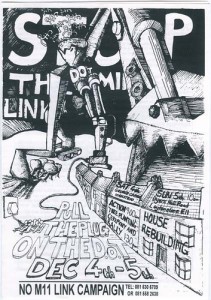 DiY culture is classically tied to protest and activism, as well as being creating alternatives in day to day life.
DiY culture is classically tied to protest and activism, as well as being creating alternatives in day to day life.
“A broad term referring to a range of grassroots political activism with a commitment to an economy of mutual aid, cooperation, non-commodification of art, appropriation of digital and communication technologies, and alternative technologies such as bisodiesel. DIY culture became a recognised movement in the 1990’s in the UK, made famous by direct action and the free party movement.”(Trapese, p.xii)
The ethics of DiY culture concern taking responsibility for your life and the world around you through positive practical direct action. Do It Yourself culture is the reason that Permanent Culture Now exists. It is one of the most empowering things that an individual can do. It can cover a range of activities and action as Richard J.F Day states in Nowtopia:
“DiY practices include dropping out of existing institutions; subversion of existing institutions, through parody; impeding existing institutions, via property destruction, “direct action case work,” blockades, and so on; prefiguring alternatives to existing institutions … and finally, construction of alternatives to existing forms that render redundant, and thereby take power from the neo liberal project.”
DiY culture is a dynamic and ever-evolving process that can help meet our day-to-day needs, develop organisations, organise protests, provide our own entertainment and education. In fact the principle of DiY can be used to do anything.
What can DiY / Counterculture teach us:
DiY and counter culture movements have a rich and varied history and existed long before the term was even thought of. Many of these movements have been extremely influential and thought provoking. To briefly list some of these:
Historically:
- Winstanley and the diggers who established a commune on land claimed by the local landowner developed in an attempt to regain the commons.
- The Luddites who saw the that industrialisation would create inequality and threaten their communities and their livelihoods, so took direct action and smashed up the weaving machines of employers who cut wages.
- The Tolpuddle Martyrs who formed a trade union to protect their rights and were deported, but a petition signed by 800,000 people which resulted in their sentences being reversed and was the beginning of the legalisation of trade unions.
More recently:
- The Land is Ours movement, which seeks to take back common land.
- The Anti Poll Tax movement that helped abolish the poll tax through mass collective action, with tactics like refusing to pay and protests across the UK
- The free festival movement and new age travellers
- The CND movement and Greenham common
 DiY / Counterculture can teach us a myriad of things such as alternative ways of living, socialising, producing resources i.e. food, housing, fuel, alternative ways of working, ways of thinking, producing art, counter culture, providing leisure activities, music scenes and art, how to create less alienating more social, communities, new ways of living, child rearing, distributing resources, decision making, how to organise groups, how to protest etc.
DiY / Counterculture can teach us a myriad of things such as alternative ways of living, socialising, producing resources i.e. food, housing, fuel, alternative ways of working, ways of thinking, producing art, counter culture, providing leisure activities, music scenes and art, how to create less alienating more social, communities, new ways of living, child rearing, distributing resources, decision making, how to organise groups, how to protest etc.
One thing that DiY projects can practically provide is time, through allowing people to meet their needs by reducing our reliance on the market and money thus freeing up time to spend on other activities. For example, who would buy a house and become a mortgage slave or tenant if you can access very low cost permanent housing through a housing cooperative? This would then mean your outgoings for your housing would be very low and so your income needed to live is would be reduced which means you could work less.
A living example of a new world:
DiY culture is not just about outcomes it is also about process. Many movements are not just alternative in their aims, but also alternative in their operation and structure through developing non-hierarchal organisations based on mutual aid. The process of operating in alternative ways can also be seen as a political act in itself, as it rejects the norms of society, often deliberately as a statement of intent.
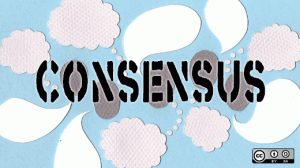 Many alternative groups operate in non-hierarchal structures and utilise consensus decision-making compared to the mainstream hierarchal structure with central authority figure at the helm. They typically adopt principles that are the opposite of capitalist values, for example favouring equality over inequality, inclusion over exclusion, participation over dominance, cooperation over competition, non-payment over payment, access over restriction.
Many alternative groups operate in non-hierarchal structures and utilise consensus decision-making compared to the mainstream hierarchal structure with central authority figure at the helm. They typically adopt principles that are the opposite of capitalist values, for example favouring equality over inequality, inclusion over exclusion, participation over dominance, cooperation over competition, non-payment over payment, access over restriction.
Collective action:
Projects may choose to utilise collective action to provide for their needs rather than purchasing services, or recycle and re-use rather than purchasing new product; they may grow their own food, rather than rely on multinational companies, develop software and distribute for free, live off-grid with independent power supplies.
All of these are political acts in that they challenge conventional mainstream structures, but as good as this is it does not take away the need for wholesale social change as they cannot address the bigger issues facing us if they remain marginal movements on the edge of the capitalist landscape. If these practices reach a tipping point then maybe they could produce a new counter hegemonic (the dominant way a culture operates and thinks about itself) movement that overtakes mainstream culture.
DiY / Counterculture Movements and State Repression:
If DiY and Counterculture movements are counter hegemonic (challenge mainstream societies domination), it will come as no surprise that DiY and Counterculture ideas and movements have been suppressed by the state. Often these movements are political in their actual actions which threaten and undermine dominant power structures and ideas.  Some are also explicitly political in their opposition to the mainstream political system and capitalism, such as anarchist social centres and the anti-capitalist movements. This is where movements can get interesting, as people come to feel the power of the state in a way that they may seem as unfair and can thus become politicised.
Some are also explicitly political in their opposition to the mainstream political system and capitalism, such as anarchist social centres and the anti-capitalist movements. This is where movements can get interesting, as people come to feel the power of the state in a way that they may seem as unfair and can thus become politicised.
A classic example of this is the way that the UK government responded to the New Age Travellers and rave movement. For many involved in that movement it was about dancing, having a good time and self-expression. The state saw this rather differently. They saw lots of people choosing to step outside of mainstream society by rejecting the 9-5 lifestyle (thus not paying tax); going to parties that were free (no tax revenue or control of events), not drinking and mainly taking ecstasy instead (a whole culture moving away from legal drugs like alcohol to illegal drugs, again no tax revenue and threat to breweries profits), combined with a movement that was bringing together thousands of disenfranchised British youth with the traveller communities alternative ideas/lifestyles. A potent mix if there ever was one for a shift away from mainstream thinking to thinking about alternatives.
Moral panics & social control:
The response to this movement by the press and government was to create a moral panic around raves and a demonising of the new age traveller movement, the same type of moral panic had been create d around mods and rockers. This then created a public opinion that would support draconian legislation in the form of the Criminal Justice Act. This attacked the movement on all fronts, that they actually criminalised the music itself by stating in the legislation of the Criminal Justice Act (CJA), that there could be no gathering of more than several persons, where the music was predominantly characterised by the succession of repetitive beats.
d around mods and rockers. This then created a public opinion that would support draconian legislation in the form of the Criminal Justice Act. This attacked the movement on all fronts, that they actually criminalised the music itself by stating in the legislation of the Criminal Justice Act (CJA), that there could be no gathering of more than several persons, where the music was predominantly characterised by the succession of repetitive beats.
They then also used it as an excuse to criminalise the travelling community and to introduce a whole new layer of legislation around a range of issues. This crackdown on what many people just saw as harmless fun, politicised a whole generation and resulted in massive anti CJA marches in London. The point is that many people did not see the political element of what they were doing, until it became apparent that the state was cracking down on this.
This highlights why the politics are important for DiY Culture as it is not just about creating alternatives it is also about fighting for them.
A few warnings:
DiY and counterculture is not without its problems.
Building movements not a lifestyle:
Not all DiY culture is political and in fact lifestyle can come before politics as Jamie Hartzell director of Small World states in the book Gathering Force:
“In DiY Culture the lifestyle comes before politics. A percentage of the people are highly prolitical: the rest are subscribing to the politics as part of the lifestyle.”
Lifestylism is not what we at Permanent Culture Now are interested in, as we believe that you cannot address the real issues we face without confronting the politics behind them. DiY Culture is important to us as it provides a way of reclaiming power and control of your own life, but it does not end there. The aim is for all people to be involved to take control. If we remain in the comfortable scenes of our movements then we risk being marginal and ineffective in our actions.
Take for example the issues of energy and food production that will be major concerns for the future. You and your friends have set up your off-grid house with its permaculture garden supplying the majority of your food. If the rest of society does not have the same, how long will it be before this is taken from you if food does become scarce?
Now if the majority of people have developed these ways of meeting their needs, or communities have developed resilience to deal with these issues, then this situation is avoided. Developing a permanent culture now is not about removing oneself from the equation by becoming a lifestyle junkie, it is about developing alternatives and bringing them to as many people as possible; to think otherwise is naive. In response to Margaret Thatcher’s infamous dictum that “there is no such thing as society”, we would argue that in the future society and the relationships between people will become paramount and therefore we need to ensure it is strong and resilient.
‘Where’s my movement gone’ Co-optation by capitalism:
“Rebellious energy often gets channelled into new forms of business, and ultimately serves to reproduce the same dynamics of commodification that led to the staleness and insipidity that inspired the revolt in the first place.” (Carlsson, p.49)
Co-optation is where one organism becomes subsumed by another. This is a major problem for the counterculture as movements enter the mainstream, they can become commoditised and sold back to people as fake alternatives, lifestyle choices and basic commodities.
Commodification is where a cultural artefact (something which symbolises the movement, or is an aspect of it) is taken by capitalism and converted into a commodity that is then sold back to the population usually trading on the values of the culture it was stolen from. This has been demonstrated time and time again with countercultural movements. Who has not seen products being sold using the symbolism of the 1960s, or using the language of the counterculture when advertising products with the use of phrases like ‘this radical new movement in fashion’ or ‘step outside of the mainstream and be an individual’ etc.
Movements are not only commoditised they can also be co-opted by becoming assimilated into the very system that they oppose. This can lead to a loss of independence, with changes being made to the organisation so it fits neatly into the system that they once fundamentally opposed.
Take for example the environmental movement and its concerns that were initially part of a counterculture movement to protect the environment. This movement opposed environmental degradation and the issues causing climate change, often with an explicit anti-capitalist stance as economic growth was seen as a driver of environmental destruction. Capitalism has now attempted to co-opt this movement by taking in its concerns and offering market-based solutions such as carbon off-setting, carbon capture etc. They use the same terms and messages as the environmental movement, yet the solutions are on their terms.
As environmental concerns have become more mainstream every product has become eco-friendly or more environmentally friendly. This is not to say that some of this is marginally good for the environment as it obviously is, but this is just capitalist business as usual with continued environmental destruction driven by growth. So recognised is this, there is even a label for it: ‘greenwash’.
As Jameson states about threats to the dominant ideology,
“Any effort to contest dominant ideology threatens to be reabsorbed by capital, so that “even overtly political interventions like those of The Clash are all somehow secretly disarmed and reabsorbed by a system of which they themselves might well be considered a part, since they can achieve no distance from it.” (Jameson, 1991)
Despite this it does pay to be pragmatic about it all, as you can utilise the resources of the system to counter it. You do have to be very careful how this is handled, as it can often lead to massive issues, such has been seen in the NGO and charity sector especially in the UK.
In the NGO and charity sector, many groups originally set themselves up to campaign for rights of someone or something, even if not explicitly anti-capitalist the problems they are dealing with are a result of the inequalities caused by capitalism i.e. poverty, homelessness etc. When these organisations begin to gain momentum a process of co-optation begins through a slow process of accepting funding, being invited to sit on panels etc. they become more and more subsumed into the dominant ideology and discourse.
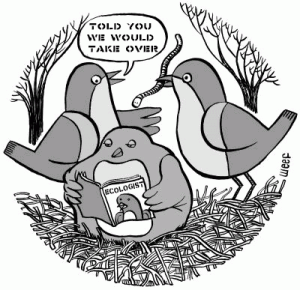 This has been evident in the voluntary sector in the UK which is now providing services to manage the problems, rather than solving them through campaigning for social change. These organisations have now become reformist and watered down and their demands have been neutered. Further compromises occur when the dynamic of self-preservation arises, when organisations become more concerned with their own survival than their original aims and mission, which in turn compromises their integrity.
This has been evident in the voluntary sector in the UK which is now providing services to manage the problems, rather than solving them through campaigning for social change. These organisations have now become reformist and watered down and their demands have been neutered. Further compromises occur when the dynamic of self-preservation arises, when organisations become more concerned with their own survival than their original aims and mission, which in turn compromises their integrity.
This can be further intensified by the conditions put in place when funding is accepted which means that priorities are dictated and organisations become funding-led and thus unduly influenced by their paymasters. They may also take on the practices of capitalism, usually linked to funding conditions or capacity building which is effectively implementing business structures within their own organisations. This is then when the co-optation is complete.
It is what we call the cuckoo effect. Cuckoos lay their eggs in the nests of other birds as well as raising their own young. They have a string shell so can be dropped in to a nest and not break; these eggs then hatch earlier and grow quicker. Once hatched they evict the eggs or young of the host leaving only itself. Then the chick encourages the host bird to feed it with its high growth rate and constant demand for food with it mouth wide open. So the cuckoo sneaks in and comes to dominate the nest, as capitalist demands and structures come in and take over the organisation.
New age spiritualism: just a distraction?
Many Co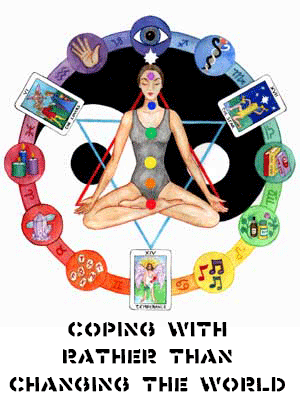 unterculture movements embrace new age spiritualism. There is a need to analyse this as this new age spirituality can become a smokescreen for the real causes of alienation. This is not to say that people should not embrace these practices and ideas and that they lack value.
unterculture movements embrace new age spiritualism. There is a need to analyse this as this new age spirituality can become a smokescreen for the real causes of alienation. This is not to say that people should not embrace these practices and ideas and that they lack value.
The question that has to be asked is the following: is the need for this escape into spiritualism a retreat away from addressing the real life problems caused by the society we live in? Do conditions under western capitalism mean that we have to transcend day-to-day life in order to remain sane. If this is the case, is this actually counterproductive to achieving real substantial change?
It is similar to the concept of heaven, in that if you put up with life now then heaven will be your reward. New age spiritualism is more pragmatic as it suggests that if you can bear the daily grind of capitalism as long as you have respite by transcending it regularly. As Zizek states about Western Buddhism,
“Western Buddhism, this pop-cultural phenomenon preaching inner distance and indifference towards the frantic pace of market competition, is arguably the most efficient way for us fully to participate in capitalist dynamics while retaining the appearance of mental sanity – in short, the paradigmatic ideology of late capitalism.” (Zizek, p26)
The point of this is not to take away from the potential benefits of these practices for individuals, but it is to question the need for them. Is this spiritual need symptomatic of the fundamental dynamics that run our lives and does it distract us from creating real concrete social changes to our lives.
Who needs conspiracy theories: isn’t truth enough?
Some DiY/Counter Cultural movements have recently become obsessed by conspiracy theories. There is talk of a new world order, chemical trails from planes, lizard men ruling the world, 9/11 theories etc. Now maybe there is some substance to some of these theories (maybe not the lizard one), but you have to ask yourself two things:
1)What can I realistically hope to achieve if I do find out that a conspiracy theory is true and
2) Is it worth the effort, or should I focus my effort elsewhere?
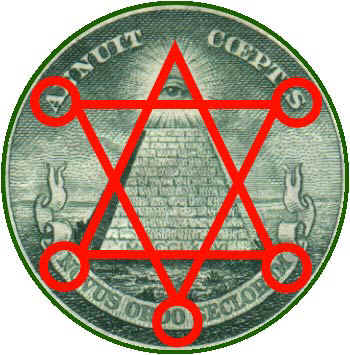 For us at Permanent Culture Now, we find what is going on directly in front of our faces much more interesting than any conspiracy theory. Take the Bilderberg meetings for example. Why do people find it surprising that elites meet in secret and make decisions. Granted, this meeting was not publicly known about in the beginning, but do people really think that the elites of our country do not use the internet or telephone to speak to each other all year around?
For us at Permanent Culture Now, we find what is going on directly in front of our faces much more interesting than any conspiracy theory. Take the Bilderberg meetings for example. Why do people find it surprising that elites meet in secret and make decisions. Granted, this meeting was not publicly known about in the beginning, but do people really think that the elites of our country do not use the internet or telephone to speak to each other all year around?
We don’t understand the fascination with this. There are elites of people that rule the world, they are called the ruling elite and consist mainly of politicians, multinational companies and extremely rich people amongst others. They dictate how the world is run through their control of massive amounts of capital and institutions which support their actions such as the WTO and the IMF.
It’s the economy
They are able to do this because we live under a capitalist system that allows economic and political power to be concentrated. As we have seen recently, the banks of the world have just been given huge amounts of our money to bail them out; this is not a conspiracy, it is what happens all the time. If you want to educate yourself on how the world works, then a good starting point would be reading information pertaining to the fractional reserve banking system and our debt-based money supply.
This is the reality, even if you have 100% evidence, still nothing happens, as it is the financial and political elites of our society investigating each other and running the show. When people talk of the new world order I think of what my friend Samuel said, “New world order, why would they need a new one isn’t the old one doing fine for them, why would they want a new one”.
If people want to spend time pursuing conspiracy theories then feel free and you may find that some of them are true, but if you want to affect social change then your efforts are probably better off elsewhere. Personally, we are more concerned with how we are going to meet our needs in the future and take back our future, rather than shadowy backdoor dealings and new world orders.
If the world was a house then it needs a DiY permanent culture overhaul:
In order to realise and bring about a Permanent Culture there is need to look at the alternatives that we have at our disposal as a means of moving away from the current unsustainable models of living and consumption. DiY / Counterculture offers us a rich and important history and a movement that persists to this day, it can help educate us in new ways of thinking and doing, it can help promote a move towards a permanent culture.
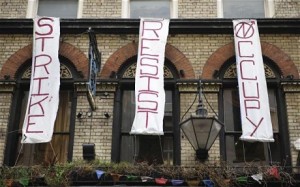 These movements in all of their various manifestations give us real life examples of practical action that is inspirational and thought provoking. Community gardens growing people’s food, housing coops housing people, Indymedia giving us the news, social centres providing space, education and cafes, radical history groups teaching us our past and direct action protests fighting for our rights. The list is endless.
These movements in all of their various manifestations give us real life examples of practical action that is inspirational and thought provoking. Community gardens growing people’s food, housing coops housing people, Indymedia giving us the news, social centres providing space, education and cafes, radical history groups teaching us our past and direct action protests fighting for our rights. The list is endless.
But it is not just about them being examples it is the DiY ethic itself which is increasingly important for a Permanent Culture as it places creative power in our hands. If you want to do something, then move from being a passive consumer to being a DiYer; want to setup an organisation to do something then get together with your mates and do it, don’t wait for it to be done for you.
We can all DiY
Want to arrange a protest, a gig, start up a zine, form a band then get out there and do it. Then show your mates how to do it and build the momentum. These is how we change the world by taking responsibility and hard work and with this comes the sense of achievement in creating and seeing an idea become reality. As Carlsson states about the benefits of undertaking DiY action outside of capitalism:
“First, their human complexity is fully engaged in creative, hands on work. Secondly, they are producing a material world that exceeds the bounds of capitals limitations, simultaneously making manifest their individual freedom … in a real sense they are already redefining and redirecting social wealth away from capital and towards socially defined needs.” (p.52)
Most of the seeds of change in our social history have originated on the margins with groups of people making their own decisions and actions on how they live their lives. This is also a continuation of our culture, as generations have influenced and built on what has gone before, building a thread that started way back in history into a rope that ends with us now. This is the essence of DiY / counterculture as a movement spreading and influencing the world, it is by this very means that a counter culture is created against the prevailing hegemony of ideas.
The aim is to make these ideas transcend the minority communities they exist in, without becoming co-opted into the dominant ideology, by creating their own mainstream, by becoming the mainstream on their own terms. This in essence is why they are so important for a permanent culture now, as we need to challenge and usurp the dominant ideology and not become subsumed by it.
References:
Zizek – The Puppet and the Dwarf. The perverse core of Christianity
Nowtopia – Carlsson
Gathering Force Diy Culture, radical action for those tired of waiting – Brass, Koziell
Handbook for changing our world – Trapese
Postmodernism, or, the Cultural Logic of Late Capitalism – Jameson
Images:
Consensus decision making image from here

